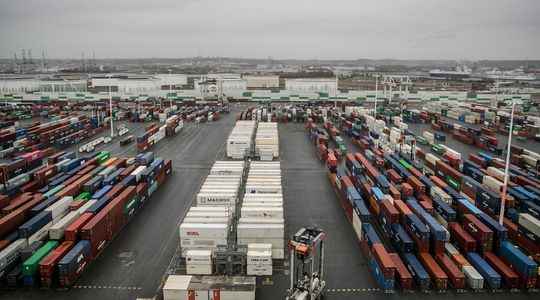The sea loses its full ministry. Return to a simple State Secretariat, placed under the authority of Prime Minister Elisabeth Borne and entrusted to the deputy of the second constituency of Guadeloupe, Justine Benin. The 47-year-old elected official, who sits in the MoDem group, thus succeeds Annick Girardin, former Minister of Overseas Territories and the Sea. Can this have an impact on the policy carried out on maritime issues? Decryption of this appointment with Christian Buchet, director of the Center for Sea Studies at the Catholic Institute of Paris, and author ofLet’s dare the sea (Le Cherche Midi).
L’Express: In your latest book, you challenged the next elected president to make maritime economics and geopolitics a top priority. How do you interpret the decision of Elisabeth Borne’s government to return to a State Secretariat for the Sea?
Christian Buchet: I prefer to wait for the reshuffle after the second round of legislative elections to really comment on the subject. If I understood correctly, Emmanuel Macron wanted a collected government. To tell the truth, I feared that the sea would completely disappear from the radar screens. There, in a certain way, it always remains arrowed through this secretariat of State. Even if it is a lower rank than ministry.
On the other hand, I do not see it as a bad thing that these matters are placed under the authority of the Prime Minister. Quite simply because these are cross-cutting issues that cannot be compartmentalised. The great difficulty of a ministry of the sea is that you are in contact with several others. Annick Girardin (former Minister for Overseas Territories and the Sea) only had full authority over maritime affairs, for example. National navy issues, drug trafficking, ocean pollution or even fishing depended on other portfolios such as Defence, the Armed Forces, the Interior, Foreign Affairs, Ecology, Research, or even the Agriculture.
In your opinion, was it consistent to dissociate maritime issues from the Overseas Ministry?
For me, there is no maritime policy without an overseas policy. The overseas territories are France’s great fortune. If our country is the second maritime domain in the world after the United States, it is 96% thanks to the Overseas Territories. If the sea shone in France under Louis XIV (my students have shown that there were more navigable waterways at the time than today), it is also because Jean-Baptiste Colbert managed both the maritime and overseas issues. But I wouldn’t say that’s the most important question. The main issue of maritime policy in France arises in the same terms in the Overseas Territories as in mainland France: these territories must turn more towards the sea.
That is to say ? How can the sea be an asset?
The sea is not simply the nose of Brittany or the eyebrow of Cotentin. It does four basic things. One: it restores competitiveness to companies. Just one example. Two out of three containers arriving or departing from France pass through Antwerp (Belgium), Hamburg (Germany) and Rotterdam (Netherlands). The closer you are to these ports, the closer you are to maritime flows. As a result, the French region best connected to river flows is Alsace-Lorraine (Le Grand Est, Ed). The further away a company is from this region, the less competitive it is since it has, on import, an additional cost to produce, and on export, a cost to sell.
Secondly, the sea allows us to reduce our CO2 emissions. Remember that the sea provides us with two fundamental services: it produces 50% of the oxygen we consume and it absorbs between 30 and 40% of our CO2 emissions. Thirdly, the sea can enable us to open up certain towns and restore their attractiveness. This requires an ambitious regional planning policy. Fourthly, it can finally make it possible to launch a policy of major works which will also create jobs.
What are the projects that this secretariat should focus on as a priority?
A good maritime policy is first and foremost a real regional planning policy. You can’t simply boil it down to questions of fishing, wind turbines or the beach. Let me explain. You don’t have a big country without a big port. The sea is what drives a country’s economy through a flow policy. In other words, it is up to us, or more exactly our leaders, to bring the sea inland. To do this, we must strengthen connectivity within our two major regional ports: Le Havre and Marseille. Despite their remarkable infrastructure, they remain too landlocked.
As long as medium-sized towns, such as Clermont-Ferrand or Limoges, are not linked to these ports by a better planned road, river and rail network, the economic development of these regions will therefore be limited. It is therefore essential, for example, to strengthen the Seine axis – to better connect Paris and Le Have – as well as to open up Marseille – to at least connect the city to Lyon, and therefore to the rail freight corridor which links Lyon to Antwerp and Rotterdam. .
This policy must, moreover, be considered at Community level. With 35 million km2, the European Union is the largest maritime domain in the world (including France’s 11 million km2). The potential is therefore enormous. We can clearly see this with China, which remained absent for five hundred years – in 1434, the power had at the time prohibited maritime navigation – and which today only has 3.8 million km2: the share maritime activities in China’s GDP is now at 8%. In France, we are only at 2.2%, and in Germany at 2.4. We should therefore wake up and put the sea back at the heart of the economic machine and think about the medium term. We have everything to win: technology, money and incredible geography!
